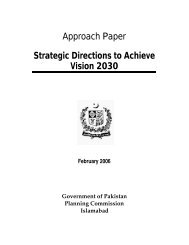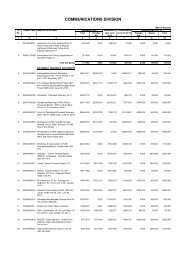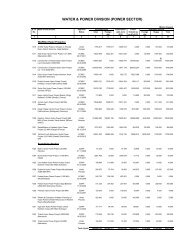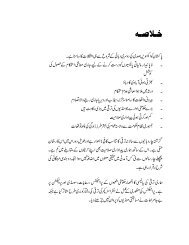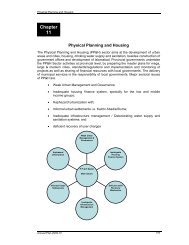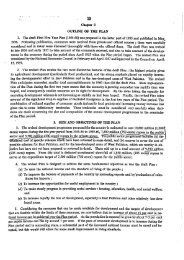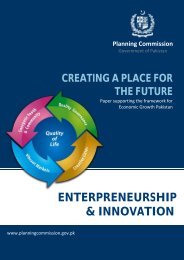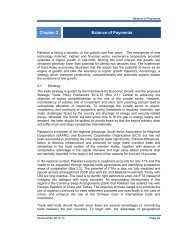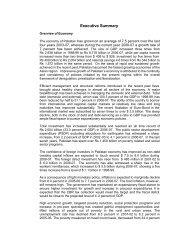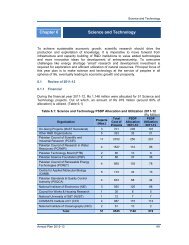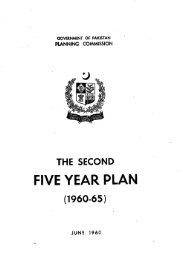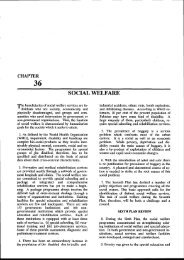Framework for Economic Growth, Pakistan - Planning Commission
Framework for Economic Growth, Pakistan - Planning Commission
Framework for Economic Growth, Pakistan - Planning Commission
Create successful ePaper yourself
Turn your PDF publications into a flip-book with our unique Google optimized e-Paper software.
International conference on “<strong>Framework</strong> <strong>for</strong> <strong>Economic</strong> <strong>Growth</strong>, <strong>Pakistan</strong>”change the legacy, texture, and complexionof the Civil Service?I don’t think that after these very cogentreasons about the crisis of governanceanybody in this room would disagree withmy hypothesis that economic growth can'ttake place unless these policies aretranslated into the benefit of the longermajority of the population and is free ofcorrosion and fully functional. This can becompared to a water system whereby wateris gushing out of the tap but if the pipethrough which water is conveyed iscorroded, leaking or clogged then thoseexpecting water at the other end of the pipewould either only get a trickle or water ofunhygienic quality that is not usable <strong>for</strong>drinking, cooking, bathing and other uses ofhuman consumption. This pipe is theinstitutions of governance which needs to befixed. <strong>Economic</strong> growth can't yield resultsunless it is backed by good governance. Inmy point of view main pillar of the goodgovernance is Civil Servants. Empiricalevidence across countries has nowconfirmed that economic per<strong>for</strong>mance notonly in terms of aggregate growth but alsothe distribution of income is determined bythe quality of institutions. These institutions,in turn, are manned by the Civil Servants.We have a history that clearly tells us that<strong>for</strong> the first two and half decades the countryhad Civil Servants who had the capacity andcompetency to take decisions in the largerpublic interest. They also enjoyed courageof conviction whereby they resistedextraneous pressures and influences whichcould disable them from taking the rightdecisions. Being wedded to the ColonialCivil Service their mindset and attitudebetrayed the tendency of guardianship andpaternalism. They were not responsive to theneeds of the population and lacked thecompassion to come to rescue the poor,marginalized and less well-to-do segmentsof the society. What is being proposed hereis that the first three attributes (3 Cs) ofCivil Servants – Capacity, Competency andCourage – have to be revived in themthrough these re<strong>for</strong>ms while the compassionhas to be imbibed through greater exposure,awareness and incentives. The end result ofthe re<strong>for</strong>m should there<strong>for</strong>e be a majority, ifnot all, Civil Servants displaying andpracticing these attributes. There is need torestore ‘3Cs’ in Civil Servants of the future.I was heading National <strong>Commission</strong> <strong>for</strong>Government Re<strong>for</strong>m (NCGR) consisting ofboth senior serving Public Servants andindividuals from the private sector who haveexcelled in their professions. We spent twoyears and submitted a comprehensive reportto the Government of <strong>Pakistan</strong> in May, 2008with very detailed and specificrecommendations <strong>for</strong> the Civil ServicesRe<strong>for</strong>ms. The gist of these recommendationsis given below:1) Open, transparent merit-basedrecruitment to all levels and gradesof public services while protectingregional representation as laid downin the constitution.2) Per<strong>for</strong>mance evaluation to be basedon measurable objectives, andassessment of key per<strong>for</strong>manceindicators.3) Promotions and career progression tobe based upon a combination of pastper<strong>for</strong>mance and assessment ofpotential with mandatory training atpost-induction, mid-career and seniormanagement levels.4) Equality of opportunity <strong>for</strong> careeradvancement to all employeeswithout preferences or reservations<strong>for</strong> any particular class. A shiftshould take place in the mind setfrom “Entitlement” to “Eligibility”.5) Replacement of the concept ofSuperior Services by equality amongall cadres and non-cadres of publicservants, federal and provincial CivilServices, professionals andgeneralists. Suitability <strong>for</strong> the job25



